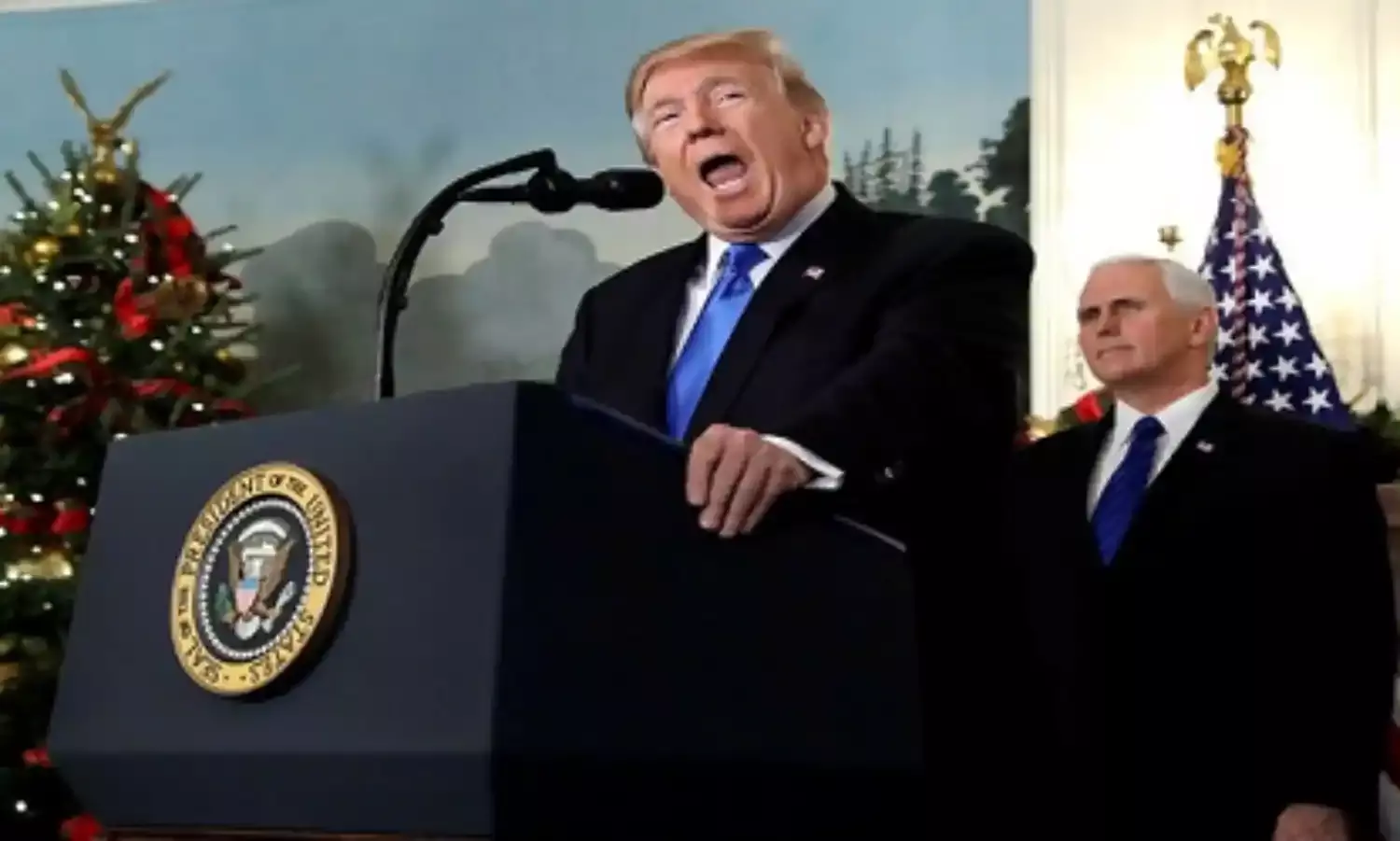US President Trump 'Recognizes' Jerusalem as Capital of Israel, World Leaders Protest
US President Trump 'Recognizes' Jerusalem as Capital of Israel, World Leaders Protest
NEW DELHI: After a much dragged brouhaha in West Asian politics, US President Trump has recognized Jerusalem as the capital of Israel on the afternoon of December 6,2017 at White House’s Diplomatic Reception Room. It is believed that Vice President Mike Pence, who is a Christian Zionist, played an integral role in this move.
Further escalating the vulnerable, sensitive and fragile status of Jerusalem, the holy centre for Muslims, Jews and Christians, this US foreign policy move has defied seven-decade long diplomatic realism of US itself. Following this ‘ultimate deal’ which Trump had promised way back in 2016 to Christian Zionists, Evangelicals and pro-Israel Jews in America during his election campaign, the US policy move has sent shock waves internationally.
The repercussions of US recognizing Jerusalem as capital of Israel are far-fetched. It is unclear now how US defines the illegal annexation of Arab East Jerusalem after the 1967 war by Israel. Journalist Noah Feldman from Bloomberg adopts a realist lens while decoding this move. He states that now Israel needs to pay one way or the other. He predicts that if this move backfires anyhow, President Trump can clearly state that Benjamin Netanyahu is the problem in the peace-deal and not vice versa.
Though, the ambiguity still continues after his White House Speech. Scrutinizing the contested political borders within Jerusalem itself, the speech does not clearly mention how much of Jerusalem is entitled for Israel. Hence, it also brokers the further negotiations of retaining East Jerusalem as the capital of Palestine, a much contested idea forming the bed-rock of Palestine-Israel Peace process through the two-state solution suggested by the Oslo peace accords of 1993.
Within minutes of this political speech, world leaders have strongly denounced it. Mahmoud Abbas, the Palestinian Authority President has opposed the move and requested Russia and Vatican for diplomatic help, the power dynamics is indeed asymmetrical. Nabil Abu Rudeineh (President’s spokesperson) has stated how this move would realize the worst fear of Palestinians and how world leaders would be contacted to prevent this ‘unacceptable action.’
Though, Israel’s Prime Minister Benjamin Netanyahu has praised President Trump for his courageous and bold step. Even the Republican Jewish Coalition have profusely thanked President Trump for keeping his election promise. Sheldon Adelson, who is the mega-donor of this coalition had invested $25 million into Trump’s presidential campaign.
Along with French President Emmanuel Macron and UK’s Labour party’s Jeremy Corbyn, several political protagonists have condemned the move. US allies like Turkey and Egypt have also voiced against it. António Guterres, the UN Secretary General has clearly stated that any alternative to the two-state solution does not exist and hence, direct talks are essential for any negotiation.
President Trump has ordered the US Embassy to shift from Tel Aviv to Jerusalem. White House officials have stated that in spite of this announcement, the move to shift the embassy would take 3-4 years and necessary groundwork and institution-building efforts needs to take place in Jerusalem.
As pro-Palestinians have started their three-day-long ‘Day of Anger’ protests against the US Embassy and Israel-occupied territories of Palestine, the US administration is witnessing its own split. US Secretary of Defence James Mattis and Secretary of State Rex Tillerson have been against this move, as it could possible lead to a disruptive impact.
“This move has not received positive acknowledgement even in United States. “There’s a reason why all past US administrations have not made this move, and why leaders around the world have warned Trump against it: It would undermine the prospects for an Israeli-Palestinian peace agreement and severely, perhaps irreparably, damage our ability to broker it,” tweeted Bernie Sanders.
Journalist Patrick Cockburn from the Independent has stated that this US foreign policy move will not have any massive impact on the peace process. Instead it would make it even more difficult for Saudi Arabia and other Sunni states to cultivate stronger, open and direct ties with Israel.
Indeed, the idea of Palestine, that remained ignored throughout the tumultuous and jeopardizing years of Arab Spring galvanizing itself, is shot back into limelight. Hamas has already warned of a new Intifada, which will certainly cause violence and mayhem in West Asia, which is still broiling with conflicts, civil-wars, ISIS and humanitarian loss.
Along with it, the idea of Jerusalem would remain contested, as ever. As of now, 86 countries have their embassies in Tel Aviv. If the international community does not acknowledge and accept President Trump’s declaration, it would have minimum impact but would certainly erode the power of US as a neutral mediator. It also questions the way in which US is acknowledging the fourth Geneva Convention that does not give the right for the occupying power to change the status-quo in Jerusalem.
Daoud Kuttab, an award winning Palestinian journalist stated that instead of this unilateral decision which is being rejected by EU, Arab League as well as Organisation of Islamic States, President Trump could have accepted the two-state solution. He could have easily recognized West Jerusalem as the capital of Israel and East Jerusalem as the capital of Palestine. In this way, US could have made a much more nuanced, well-studied and strategic geo-political move for solving the Israel-Palestine peace process and President Trump could have followed with his election promises, too.
Meanwhile, US State Department had also threatened in mid November to close down PLO’s office in Washington, though the move has a 90-day time limit to be abandoned.
Nevertheless, the pro-Palestine supporters internationally are calling President Trump’s speech as the new ‘Balfour Declaration.’ The degree and extent to which this recognition would galvanize protests is still unpredictable.




